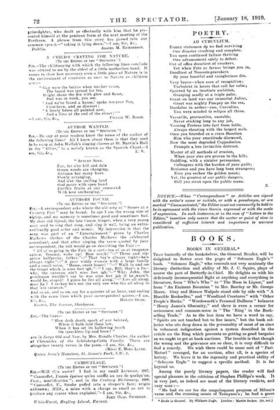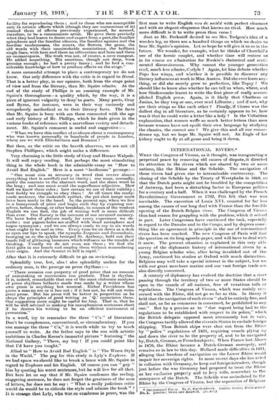BOOKS.
BOOKS IN GENERAL.*
TEAT butterfly of the bookshelves, the General Reader, will ho delighted to flutter over the pages of "Solomon Eagle's" book. "Solomon Eagle," who conceals not very anxiously the literary distinction and ability of Mr. J. C. Squire, plays of course the part of Butterfly-in-Chief. Ho delights us with his deliciously inconsequential flight at anything and everything in literature, from " Who's Who " to " The Muse in Liquor," .and from "An Eminent Baconian" to Mrs. Barclay or Mr. Georgo Moore. Gray and Horace Walpole stand side by side with " A Horrible Bookseller," and "Woodland Creatures" with "Other People's Books." "Wordsworth's Personal Dullness" balances " Henry James's Obscurity," and there is even a corner for seriousness and common-sense in " The ' Ring in the Book- selling Trade." As to the last item we have a word to say. " Spirits are not touched but to fine issues," but the book col- lector who sits deep down in the personality of most of us rises in vehement indignation against a system described in the article on the Ring which prevents us getting as good bargains no we ought to get at book auctions. The trouble is that though the wrong and the grievance are so clear, it is very difficult to find a remedy. We wish there could be some sort of " Peri- Mutuel " arranged, for an auction, after ell, is a species of lottery. We leave it to the ingenuity and practical ability of " Solomon Eagle " to suggest a specific method. It is far beyond us.
Among the purely literary papers, the reader will find special pleasure in the criticism of Stephen Phillips's work. It is very just, as indeed are most of the literary verdicts, and very SOHO "He had an ear for the magniloquent progress of Ddilton'e verse and the crooning music of Tennyson's; ho had a great • Books is General. By abainoni Fails. London : Martin Stoker. [do. net.] facility for reproducing them ; and to those who are susceptible only to artistic effects which (though they are unconscious of it) remind them of effects previously experienced, he seemed, therefore, to be a consummate artist. He gave then: precisely what they had learnt to desire and expect from It poet,t he familiar splendours and the familiar silences, the familiar agonies and the familiar tenderneenes, the scents, the flowers, the gems, the old words with their unmistakable associations, the brilliant single lines, with here and there an alliteration and here and there an onomatopoeia. His work was not, of course, a mere compost. Ho added something. His emotions, though not deep, were genuine enough - he had a pretty fancy ; and he had a con- siderable knowledge of how to produce effects on the stage.'' A more successful attempt to place a contemporary we do not know. Our only difference with the critic is in regard to Herod. That is a better play, in our opinion, both from the stage point of view and front the literary, than Mr. Squire admits. At the end of the study of Phillips is an amusing example of Mr. Squire's thoroughness—a quality which, by the way, it is a piece of ignorant vulgarity to deny to poets. Many poets, Gray and Byron, for instance, were in their way curiously and scrupulously methodical as to their literary facts. The facts that Mr. Squire is busy with are those connected with the age and early history of Mr. Phillips, which he finds given in the various books of reference with a marvellous variety and detach- ment. Mr. Squire's comment is useful and suggestive :-
" When we have this conflict of evidence about a contemporary who was known personally to hundreds of people in London, where are we with Elizabethans and Romans ?
But then, as the critic on the hearth observes, wo are not all Stephen Phillipses, which might make a difference.
Very charming is the little study of Gray and Horace Walpole. It will well repay reading. But perhaps the most stimulating thing in the whole book is the admirable essay on "How to Avoid Bad English." Here is a most "luciferous" passage:— " One must aim at accuracy (a word that covers almost everything that is needful) and at clarity ; one must, normally, prefer the concrete to the abstract word, and the short wont to the long - and one must avoid the superfluous adjective. How well we know these rules ; how certain we are of their validity;how feebly we struggle to obey them At all times the ready- made sentence, the makeshift epithet, the pot-shot image must have been ready to the hand. In the present age, when we live in a honeycomb of print and begin each day by exposing our- selves, before, dining, or after breakfast, to masses of the weakest English we can find, the job of writing well is more difficult than ever. Our fluency is the measure of our accursed memory. We have bales of phresee ready for every experience we de- eeribe ; our pigeon-holes are stuffed with dead metaphors and bogus synonyms ; end we are always ready to say in nix words what ought to be said in two. Every time we sit down at a desk or open our lips to speak, the nymphs Jargonia and Journelesia, besieging us as the sylphs besieged St. Anthony, hold out their hands full of glittering treasures which will save us the trouble of thinking. Usually we do not even see them ; we find the fatal gifts in our hands and employ them without remembering their origin. And the descent to hell is rapid."
After that it is extremely difficult to go on reviewing.
Splendidly true, but, alas ! also splendidly useless for the ordinary man, is the passage on prose rhythms :— " There remains one property of good prose that no amount of painstaking or instruction can produce. That is rhythm. It is, indeed, remarkable that one of the most elaborate analyses of prose rhythms hitherto made was made by a writer whose own prose is anything but musical.. Either Providence has given a man an ear or it has not ; if it has not, ho will not write great prose. But his prose will be better in proportion as he obeys the principles of good writing as Q.' enunciates them. One suggestion more might be useful for hint That. is, that he will be well advised in making hie uneuphonious sentences short if he desires his writing to be an efficient instalment of persuasion."
In a word, try to remember the three " C's" of literature. Don't be cacophonous, conventional, or eircurulocutory. If you can manage the three " C's," it is worth while to try to teach yourself to write. As the father says to the son with artistic ambitions in Charles Keene's immortal picture " featuring " the National Gallery, " There, any boy ! If you could paint like that I'd have you taught."
Allied to " How to Avoid Bad English " is " The Worst Style in the World." The peg for this study is Lyles Hop/toes. If we had space we should like to break a lance with Mr. Squire in regard to Euphues and his English. Of course you can " guy " hint by quoting his worst sentences, but ho will live for all that. But here let us say that if Mr. Squire condemns the reeling, staggering sentence, he does not forget the greatness of the man of letters, for does not he say : " What a really judicious critic would do would be to ridicule the style and admire the book" ? It is strange that Lyly, who was.so cumbrous in prose, was the first man to write English revs de eroded with perfect clearness and with an elegant eloquence that knows no rival. How much more difficult is it to write prose than verse !
Just as Mr. Peclutniff desired to see Mrs. Todgers's idea of a wooden leg, to there are a hundred things on which we desire to hoar Mr. Squire's opinion. Lot us hope he will give it to us in the future. We wonder, for example, what he thinks of Churchill's use of the heroic couplet, and whether time will restore us in its course an admiration for Ruskin's rhetorical and senti- mental discursiveness. Why cannot the younger generation read, much less admire, Carlyle ? Again, lot him debate whether Ptipo has wings, and whether it is possible to discover any literary influences at work in Miss Austen. Did she ever learn any- thing, or did she merely grow to perfection, like Topsy ? Wo should like to know also whether he can tell uS when, where, and how Sindercombe learnt to write the first piece of really accom- plished English prose. Again, is it likely that Chatham or Junius, be they two or one, ever read Lilburne ; and if not, why are their stings so like each other ? Finally, if Cicero was the dullest dog in all literature, as he certainly appears to be. how was it that he could write a letter like a lady ? Is the Voltairian explanation, that women write so much better letters than men because women have not spoilt their own language by studying the classics, the correct one ? We give this and all our conun- drums up, but we hope. Mr. Squire will not. An Eagle of his kidney ought to fly at all game and bring it down.



































 Previous page
Previous page